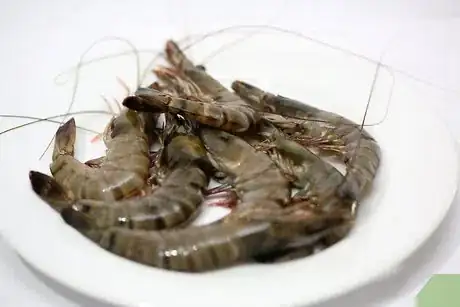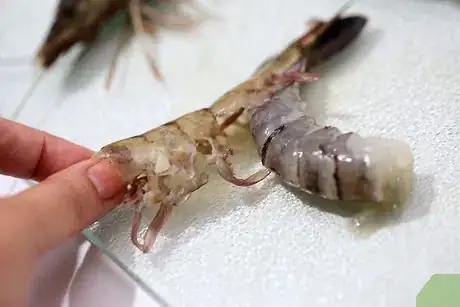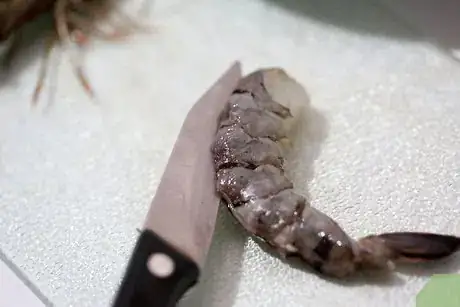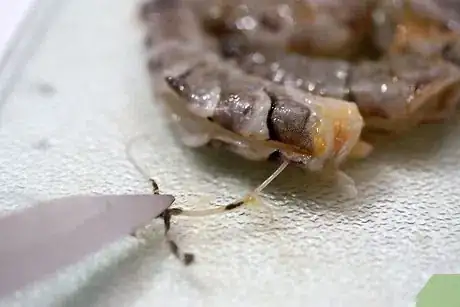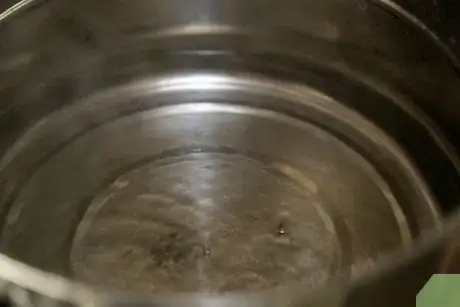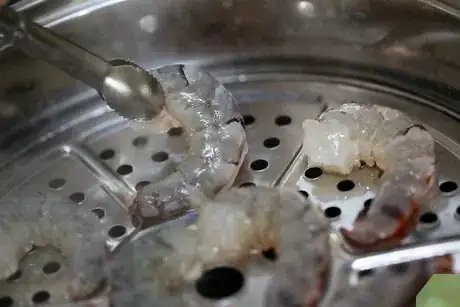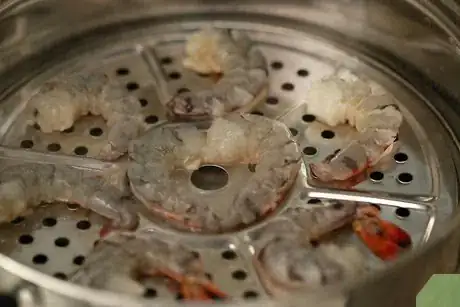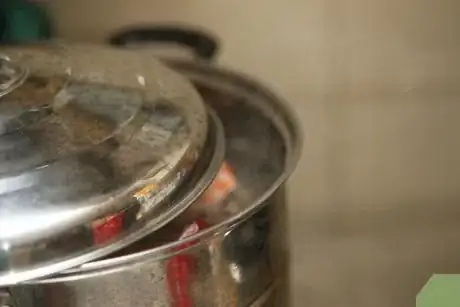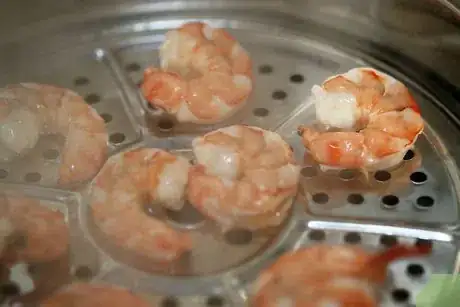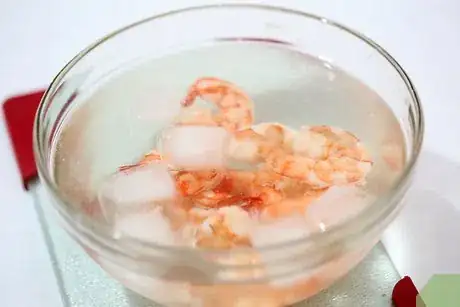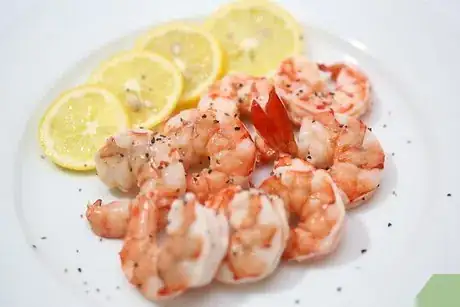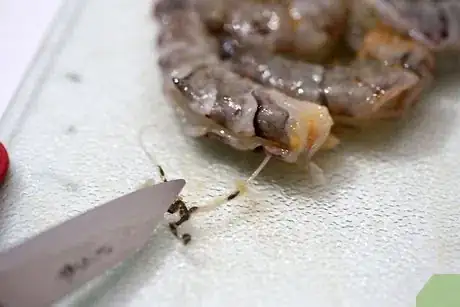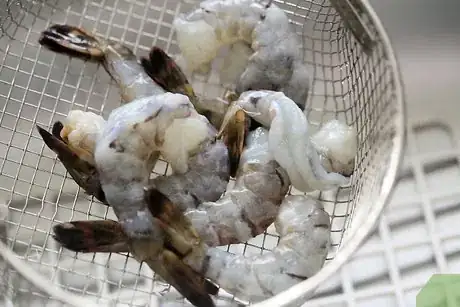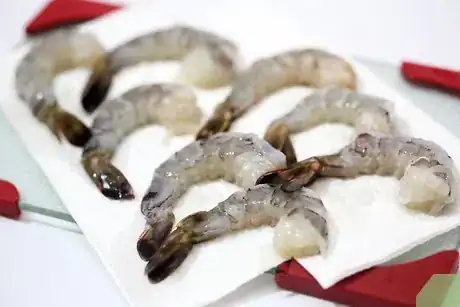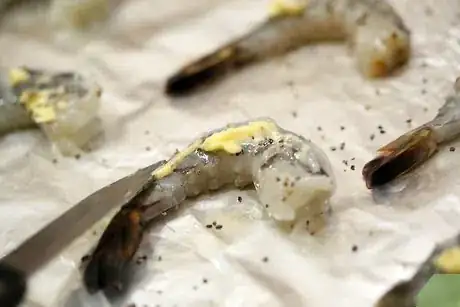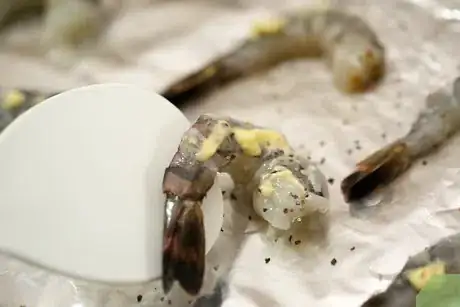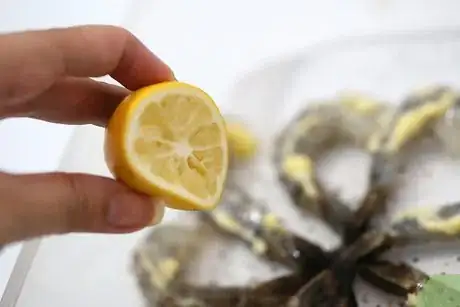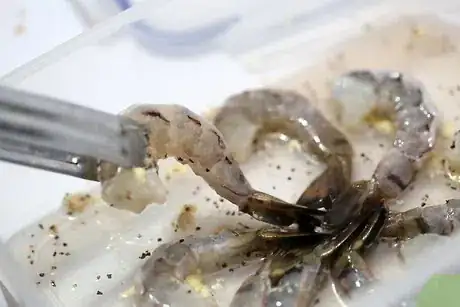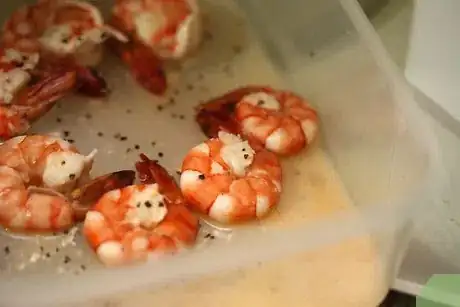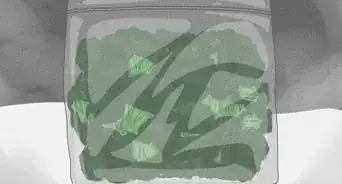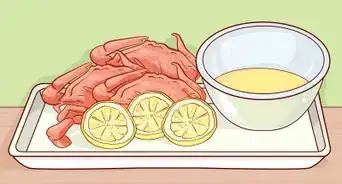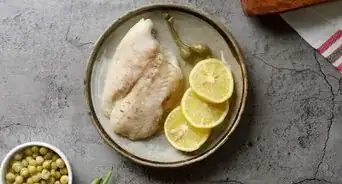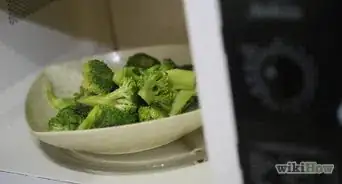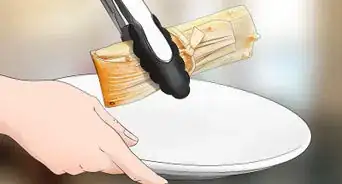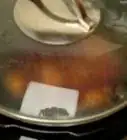This article was co-authored by wikiHow Staff. Our trained team of editors and researchers validate articles for accuracy and comprehensiveness. wikiHow's Content Management Team carefully monitors the work from our editorial staff to ensure that each article is backed by trusted research and meets our high quality standards.
The wikiHow Video Team also followed the article's instructions and verified that they work.
This article has been viewed 387,632 times.
Learn more...
When steaming shrimp, the main thing to remember is that this seafood favorite cooks quickly and should never be overcooked. You can steam shrimp on the stove, but you can also steam-cook it in the oven or microwave. Here's how to do it each way.
Ingredients
Makes 2 to 4 servings
- 1 lb (450 g) shrimp, still in their shells
- 1 Tbsp (15 ml) lemon juice (optional)
- 1 tsp (5 ml) salt
- 1/2 tsp (2.5 ml) ground black pepper
- 1/4 tsp (1.25 ml) garlic powder (optional)
- Ice water (optional)
Makes 2 to 4 servings
- 1 lb (450 g) shrimp, still in their shells
- 3 Tbsp (45 ml) melted butter or 2 Tbsp (30 ml) olive oil
- 1/2 tsp (2.5 ml) salt
- 1/2 tsp (2.5 ml) ground black pepper
- 1/4 tsp (1.25 ml) garlic powder (optional)
Makes 2 to 4 servings
- 1 lb (450 g) shrimp, still in their shells
- 1 Tbsp (15 ml) water
- 1 Tbsp (15 ml) olive oil
- 1 Tbsp (15 ml) lemon juice
- 1/2 tsp (2.5 ml) salt
- 1/2 tsp (2.5 ml) ground black pepper
- Ice water (optional)
Steps
Traditional Stovetop Steaming
-
1Peel and devein the shrimp. The clear shell can be peeled off with your fingers and the dark vein running through the center of the back can be removed with the tip of a sharp knife.[1]
- If the head and legs are still attached, pull them off with your fingers.
- Use your fingers to peel back the outer shell, starting from the head end and working toward the tail. The tail can be removed or kept on for decoration.
- Cut down the center of the shrimp's back with a paring knife. Make a shallow cut that is just deep enough to reveal the vein.
- Dig the vein out with the tip of your knife.
-
2Boil a small amount of water in a saucepan. Fill a large saucepan with 1 to 2 inches (2.5 to 5 cm) of water and heat on the stove over high heat. Place a steamer rack inside of the saucepan as the water comes to a boil.
- If desired, you could add lemon juice and salt to the water instead of adding it to the shrimp. Doing so will create a more subtle flavor, allowing more of the shrimp's natural taste to come through.
- If you do not have a steamer rack or steamer basket, you could use a metal or wire mesh colander, instead.
- The water level should be below the bottom of the steamer basket. Do not allow the water to come through the steamer basket. If this happens, you may end up boiling the shrimp instead of steaming it.
Advertisement -
3Place the shrimp on the steamer rack. Arrange the shrimp in a single layer on the steamer rack and sprinkle with the salt, pepper, and garlic powder, or any other seasonings you choose.
- It is best to keep the shrimp in a single layer, but if you end up having multiple layers, the shrimp should still cook through. They may not cook quite as evenly, but the difference will not usually be very distinguishable.
- Since there are gaps in the bottom of the steamer rack, you should not toss the shrimp after adding the seasonings, or else a large portion of the seasonings will be lost as you turn the shrimp over.
- If you used salt in the water, you do not need to use salt on the shrimp now.
-
4Steam the shrimp until they turn opaque. The exact amount of time will vary depending on the size of your shrimp. Standard size shrimp will cook in about 3 minutes, covered, once steam starts building inside the pan.
- You need to place the saucepan lid on the pan as you cook the shrimp. This is the only way steam can build up, and the steam is necessary for cooking the shrimp.
- Wait until after steam starts escaping from the lid on the pot before you start timing. This alone can take another few minutes.
- Check the shrimp after the first 2 minutes to avoid overcooking it.
- When done, shrimp will curl up into the shape of the letter C.
- For jumbo or colossal shrimp, add another 2 to 3 minutes.
-
5Transfer to ice water if serving chilled. If you plan to serve the shrimp cold, immediately remove them from the steamer rack using a slotted spoon and dunk them into a bowl of ice water.
- Pour the bowl of ice water and chilled shrimp through a colander to remove the water before serving.
-
6Alternatively, serve hot. If you plan on serving the shrimp hot, transfer them from the steamer rack using a slotted spoon and place them in a serving dish.
- You should serve the shrimp immediately if you plan on serving them without chilling them. Do not refrigerate and reheat. If you do this, you may end up overcooking the shrimp, and the consistency will turn rubber-like.
Oven Steaming
-
1Preheat the oven to 450 degrees Fahrenheit (230 degrees Celsius).[2] Prepare a shallow, small baking pan by quickly spraying it with nonstick cooking spray.
- You could line the pan with nonstick aluminum foil or parchment paper, if necessary, but cooking spray or shortening is preferable.
-
2Devein the shrimp. For oven-steaming, shrimp should be left in their shells, so you do not need to peel them. Instead, cut open a small slit in the back of the shell and remove the vein through it.
- Use a pair of kitchen scissors to cut into the shell and just barely into the flesh of the skin just above the shrimp's back.
- Dig the vein out with the tip of a paring knife.
-
3Rinse and drain the shrimp. Place the shrimp in a colander and rinse lightly under cool, running water. Drain the excess water over the sink.
- Place the colander onto a few layers of clean, dry paper towel after draining the majority of the excess water out. Doing this will allow any remaining water to drain, as well, without making a mess on your counter.
-
4Arrange the shrimp in the prepared pan. Place the shrimp in your baking pan in a single, even layer.
- A single layer is preferable since it promotes the most even cooking, but strictly speaking, it is not completely necessary. Just make sure that the shrimp is in even layers, and avoid creating more than two full layers of shrimp in the pan.
-
5
-
6Cover and cook until pink. Cover loosely with aluminum foil and oven-steam for a total of 7 to 8 minutes, turning once after the 5 minute mark. Note that larger shrimp may take longer to cook.
- If working with jumbo or colossal shrimp, steam-cook for another 2 to 4 minutes.
- Turn or stir the shrimp with a slotted spoon, spatula, or tongs after the first 5 minutes.
- Cover the pan with a loose layer of aluminum foil to trap more of the steam inside.[3]
-
7Serve hot. Drain any excess liquid and transfer the shrimp to a serving dish.
Microwave Steaming
-
1Arrange shrimp in a microwave-safe dish. Keep the shrimp in a single layer with the tail ends pointing inward.
- A 12-inch (30.5 cm) shallow, round, glass casserole dish is recommended, especially if it has a microwave-safe lid. Any dish that can fit the shrimp in a single layer could be used, though.
- If you have one, a silicone steamer is actually the ideal choice, but these can be difficult to find. These steamers create a vacuum that allows steam to build from the food's own juices.[4]
- Avoid using a dish that requires you to stack the shrimp in multiple layers. If this happens, the shrimp may not cook through evenly.
-
2Add the water, lemon juice, oil, and seasonings. Drizzle with the liquid ingredients. Lightly sprinkle with salt and pepper or other seasonings, adjusting the amount as desired according to your own tastes.
- You should only have a small amount of liquid in the dish, so hold off on any liquid seasonings other than those mentioned here. If you have too much liquid, the shrimp with boil instead of steam.
- Gently toss the shrimp with a form to coat each one in the mixture of flavors. When done, though, make sure that the shrimp are returned to their original position with the tail ends pointing inward.
-
3Cover and microwave until the shrimp are pink and opaque. Cover the dish with microwave-safe safe plastic wrap and cook on high until done. When done, shrimp should also curl up into a C-shape. Note that the exact time will vary based on the size of the shrimp.[5]
- Miniature and small shrimp will need 2 1/2 to 3 minutes.
- Medium or standard shrimp will need 3 to 5 minutes.
- Large or jumbo shrimp will need 6 to 8 minutes.
- Colossal shrimp will need 8 to 10 minutes.
- Check for doneness after the minimum cooking time.
- Vent the plastic wrap by poking it once with the tips of a fork.
- Alternatively, if the dish has a microwave-safe lid, cover it with that, instead. Make sure to vent the lid by placing it on the dish slightly askew or by opening any built-in vents.
- The dish needs to be mostly sealed in order to allow steam to build inside, but do not keep it completely sealed. Doing so could cause too much pressure to build inside.
-
4Let stand and serve immediately. Allow the shrimp to stand for 1 to 2 minutes before draining excess liquid from the dish. Serve while still hot.
- Miniature to medium shrimp will only need to stand 1 minute, while jumbo and colossal shrimp will need 2 minutes.
- Drain the shrimp by pouring out excess liquid or by removing them with a slotted spoon and placing them on a serving dish.
- Since the shrimp has not been deveined, you should provide your dinner guests with a paring knife that they can use to fish the vein out of the cooked shrimp as they consume it, if they so desire. No harm will come from eating the vein, however, so this is mostly for the sake of aesthetics and texture.
- Alternatively, chill, and serve cold. If you want to serve the shrimp cold, transfer the cooked shrimp to a bowl of ice water to stop the cooking process immediately. Afterward, place it in the refrigerator for at least 30 to 60 minutes.
Community Q&A
Did you know you can get answers researched by wikiHow Staff?
Unlock staff-researched answers by supporting wikiHow
-
QuestionIs it better to boil or steam shrimp?
 wikiHow Staff EditorThis answer was written by one of our trained team of researchers who validated it for accuracy and comprehensiveness.
wikiHow Staff EditorThis answer was written by one of our trained team of researchers who validated it for accuracy and comprehensiveness.
Staff Answer wikiHow Staff EditorStaff Answer
wikiHow Staff EditorStaff Answer -
QuestionHow long do you steam frozen shrimp?
 wikiHow Staff EditorThis answer was written by one of our trained team of researchers who validated it for accuracy and comprehensiveness.
wikiHow Staff EditorThis answer was written by one of our trained team of researchers who validated it for accuracy and comprehensiveness.
Staff Answer wikiHow Staff EditorStaff Answer
wikiHow Staff EditorStaff Answer -
QuestionCan you steam shrimp without the shell?
 wikiHow Staff EditorThis answer was written by one of our trained team of researchers who validated it for accuracy and comprehensiveness.
wikiHow Staff EditorThis answer was written by one of our trained team of researchers who validated it for accuracy and comprehensiveness.
Staff Answer wikiHow Staff EditorStaff Answer
wikiHow Staff EditorStaff Answer
Things You'll Need
Traditional Stovetop Steaming
- Paring knife
- Large saucepan
- Steamer basket, steamer rack, or metal colander
- Slotted spoon
- Large bowl (for ice water)
- Serving dish
Oven Steaming
- Kitchen scissors
- Paring knife
- Small baking dish
- Nonstick cooking spray
- Colander
- Aluminum foil
- Slotted spoon
- Serving dish
Microwave Steaming
- Microwave-safe dish
- Microwave-safe plastic wrap
- Fork
- Large bowl (for ice water)
- Paring knife
- Serving dish
References
- ↑ http://www.simplyrecipes.com/recipes/how_to_peel_and_devein_shrimp/
- ↑ http://glutenfreeeasily.com/a-perfect-meal%E2%80%94oven-steamed-shrimp/
- ↑ http://www.cooks.com/recipe/rq3rh5x9/oven-steamed-shrimp.html
- ↑ https://www.thekitchn.com/microwave-silicone-steamer-fro-47126
- ↑ http://articles.philly.com/1989-03-12/food/26128421_1_pound-shrimp-devein-tail-ends
About This Article
Before steaming shrimp in the microwave, drizzle the shrimp with a little bit of water, lemon juice, and seasoning, like salt and pepper. Then, toss the shrimp so that they are evenly coated, and position them on a microwave-safe dish so that their tails are pointing in and touching each other. Next, cover the dish with microwave-safe plastic wrap or a lid and microwave the shrimp for 2 to 10 minutes, depending on their size. Finally, let the shrimp stand for 1 to 2 minutes, drain any excess liquid, and serve. To learn how to steam shrimp in the oven, read on!
